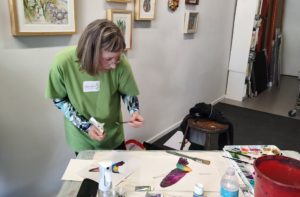Information for Teachers
Support the climate while you support your art
 If you are an artist who instructs people in classroom settings and you have a desire to inspire others to act on climate, please join our efforts. You can conduct your own art workshops while facilitating climate action. While you guide students in expressing themselves by making art that focuses on the environment, you can inspire them to talk to others about climate change and to personally act to help mitigate climate destruction. We feature our Climate Action Toolkit as your guide to climate conversation.
If you are an artist who instructs people in classroom settings and you have a desire to inspire others to act on climate, please join our efforts. You can conduct your own art workshops while facilitating climate action. While you guide students in expressing themselves by making art that focuses on the environment, you can inspire them to talk to others about climate change and to personally act to help mitigate climate destruction. We feature our Climate Action Toolkit as your guide to climate conversation.
After your workshop, ACA will exhibit the student work in a virtual gallery and may help negotiate a gallery show in a physical location in your area (conditions permitting).
FAQs:
How does a climate art workshop work for me?
We offer two models for art teachers. You can choose how you would like to participate:
- You can organize your own workshop in a location of your choosing. You would collect standard fees to cover your costs and which include enough extra for each student to join Artists for Climate Awareness. In the workshop, you would distribute and talk about climate action, referring to the Climate Action Toolkit. Teach and paint using your own instructional techniques, and then donate the collected membership fees to Artists for Climate Awareness.
- ACA can handle workshop facilities, manage registrations, and advertise in your location and then pay you instructors’ fees in accordance with your professional expectations.
In either case, we will manage a virtual exhibit of the students’ work and may help to organize a physical show if your situation permits. As an instructor, we will feature your work in our online instructors’ art gallery.
How would I facilitate a climate-related workshop?
You are the teacher. We trust that teaching workshops is your area of expertise. You would facilitate the making of art about climate and environmental topics while engaging students in discussions of how to communicate about it. Your students will express themselves with art while discussing climate change and how they can act on it.
If you are best at facilitating a one-subject paint-along, you can pick one topic (see below) and use your own techniques and methods. On the other hand, if you are good at mentoring students while they paint their own subjects, it’s the perfect environment for conversation about appreciating and expressing what we love and may lose.
In all situations, painting these topics serves as an opener for the group’s “what we can do” conversation. See our Discussion Suggestions for ideas. We believe that by increasing the dialogue everywhere, more people will understand, act, and become ambassadors themselves. We provide the Climate Action Toolkit with every event.
Workshops can be any length, depending on your students’ age or abilities and your own comfort level.
Where would I get ideas of topics for a climate-related art workshop?
This is a question we frequently receive.
We suggest you pick a topic that appeals to you or art students you know. Topics can be organized in myriad ways:
- Geographical areas, such as: barrier reefs; mountains; deserts; redwood forests; farmland; city terrain; chosen rivers; lakes (e.g., Great lakes); tropical areas; and northern winters. People readily identify with areas they know or have traveled to see.
- Biological categories, such as: pollinators, trees, wildflowers, oceanic life; bird life, coral reefs; and species brought back from the brink. People have individual passions that drive them to create art.
- Landscape categories, such as: rivers; lakes; oceans; mountains; forests; and farms. Plein air painters especially enjoy painting outdoor scenes.
- Local issues, such as: polluted waterways; invasive species; dirty energy; watershed problems and solutions.
- Personal issues: Encourage participants to consider their personal experiences with climate change: How does changing climate affect you? What do you miss because our climate is changing rapidly?
- Spiritual effects of climate change. Formats could include: mandalas, collage, and symbolic art.
When you choose your topic, determine how your students can include a climate message. Some serious themes related to the above topics might be: drying rivers and lakes; invasive plants; increasing storms; fires. On the other hand, positive messages of change might include: species revival; art with buildings using wind and solar; and more.
Let us help you with topic ideas!
Contact us
How would I prepare for a climate art workshop?
You would design a workshop as you always do, but plan to include effective climate dialog. We will provide you and your class with our Climate Action Toolkit. In addition, we recommend a book by a climate scientist who specializes in speaking about it to skeptical audiences: Saving Us: A Climate Scientist’s Case for Hope and Healing in a Divided World by Katharine Hayhoe, available in various online bookstores. In addition, here are a few short readings:
1) Lessons on Communicating the Climate Crisis, from Climate-Exchange.org: https://empower.agency/how-to-effectively-communicate-about-climate-change/
2) Katharine Hayhoe, Why communication is critical to tackling the climate crisis: https://www.siliconrepublic.com/innovation/katharine-hayhoe-climate-crisis
3) The Free downloadable eBook from Goodside: The Good Guide to Effective Climate Action in the 21st Century
4). Making Climate Change Fun, from My planet Action New Zealand https://www.myplanetaction.co.nz/
Who can I contact about hosting a climate art workshop?
If you are interested in talking with us about hosting an art workshop focusing on climate change, please